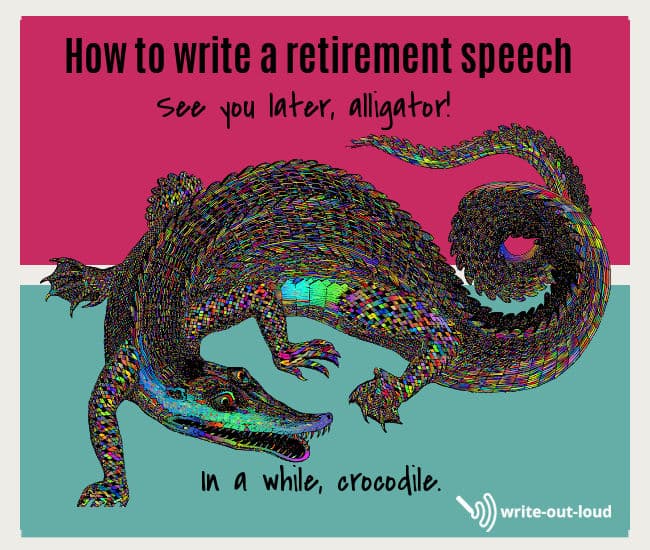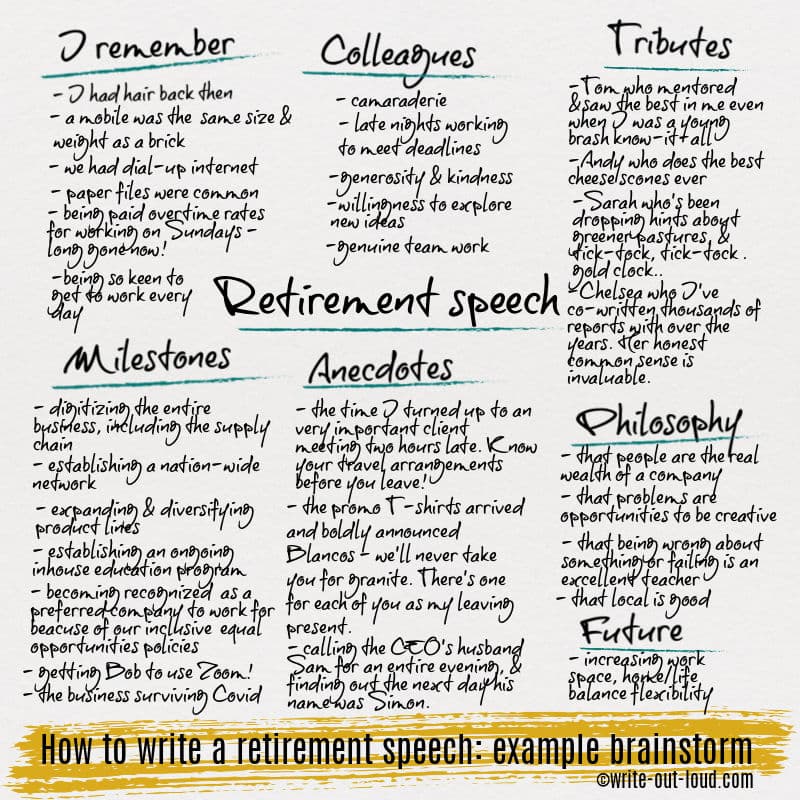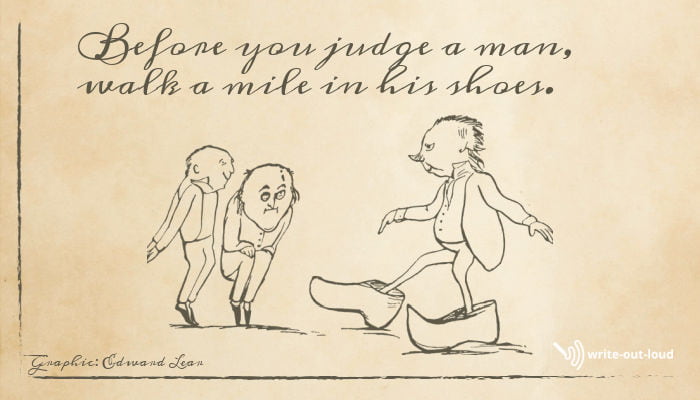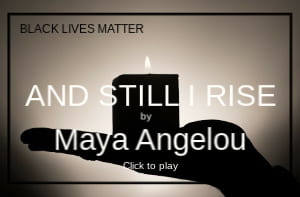- HOME ›
- How to write a retirement speech
How to write a retirement speech
Content ideas for a great retirement speech
By: Susan Dugdale | Last modified: 01-31-2024
The prospect of writing a retirement speech either for yourself or for someone else might seem daunting.
The reality is, fortunately, that it's not as hard as it first appears to be. ☺
Follow the steps outlined below and you'll finish with a speech you'll be happy to give, and listeners will be happy to hear.
What you'll find on this page:
- how to collect up material for the speech - content prompts to use to brainstorm*
- an example of a completed brainstorm
- notes on tone, theme and speech length
- how to write and test the speech
- links to an example retirement speech and a collection of suitable quotations you may like to use
* brainstorm - the name given to an invaluable prewriting technique used to generate lots of potential ideas about a topic

Beginning the process of writing
Before you even attempt to write you need to collect your ideas together.
The most efficient way I know to do this is to do a brainstorm. (Scroll down to see an example.)
First grab yourself a large sheet of paper or open a new document.
Give yourself a time limit
Before you begin set yourself a time limit - say 30 minutes.
Then use the retirement speech starter headlines and the content suggestions* next to each one to kick start your creative juices.
Put down as much as you can under each heading. Do NOT self edit. Nothing is too trivial! You don't have to spell properly, or write complete sentences. All you have to do is allow your ideas to flow.
You will rearrange, expand, trim or delete them later but for now it's important you put whatever thought occurs down, to capture it before it disappears.
*You can see these headlines and content suggestions in action in my sample brainstorm.
Retirement speech starter headlines
I remember ...
Suggestions: starting out 'x' years ago, what was most important to the company, what I looked like back then, what the pinnacle of technological sophistication was ...
Colleagues ...
Suggestions: those who've been influential, friends, major campaigns/accounts worked on together ... What special qualities will you miss about these people?
Tributes ...
Suggestions: Who have you admired and why? Who has inspired you? Name and thank them. Especially those who contributed majorly in either little or large ways, making your work life easier or more pleasant; from the cook in the canteen who regularly kept back a sandwich just for you, or the lift operator who always held the door for you up.
Milestones ...
Suggestions: significant personal achievements, the firm's major achievements ...
Anecdotes ...
Suggestions: amusing daft stories about either yourself or perhaps the people you worked with. (But mostly featuring you, because people appreciate a person who is self-aware and secure enough to make fun of themselves, one who doesn't need to call out blips in behavior, or lapses in logic in others in order to make themselves look good.)
The future ...
Suggestions: Personal future: what I'm looking forward to, where I'll be, what I'll be doing ...
The firm's future: where do you see it going? What challenges does it face?
Philosophy ...
Suggestions: the values that have been important over the years, still are and why

Getting it together
Now that you have the raw material you're ready to shape it. But before you begin to write the speech you have three more important elements to consider. What you decide will have an impact on the final outcome.
1. What tone do you want your speech to have?
Because many retirement speeches are delivered over a dinner or at a party, most people strive for a balance of light-hearted self-deprecating humor, sincerity and respect.
Put yourself in your colleagues' shoes and ask yourself what you would appreciate and enjoy listening to.
- Do you want to hear a diatribe about the opportunities the company missed through bureaucratic bungling over the last humpteen years?
- Is a detailed personal brag sheet charting your meteoric rise appropriate?
- What about a breakdown of the company's culture?
- Or talk of in-group events, or people, that nobody, aside from a small section of the audience, either understands or knows?
- Or worst of all, an embittered harangue citing the numerous instances (large and small) when your contributions were maligned, and your leadership potential was overlooked by varying nincompoops, but principally the halfwits who comprise the senior management team?
By all means keep the speech real. However make it more about the positive aspects of the business and the people who work there rather than yourself.
2. Consider using a theme
A theme is useful to tie all the segments of your speech together. It's a core idea uniting them, and giving them cohesion.
Here are some ideas you could make work well: team effort (through uniting one achieves more), friendship, loyalty, the value of ongoing education, that youth is wasted on the young, humor, the importance of believing in one's dreams ...
3. How long are you going to speak for?
How long you are expected to speak for governs how many words you write.
A relatively informal retirement speech to be given at a social gathering is usually 3 - 5 minutes long. That's between 625 - 750 words depending how fast you speak.* Much more and you run the risk of losing people's attention.
In a formal setting you may be expected to speak for 10 minutes, and then some.
If you are unsure of what's being asked of you, find out. Whatever the time limit, its good practice to finish within it. In the words of Franklin D Roosevelt, USA's 32nd President - March 4, 1933 – April 12, 1945: "Be sincere; be brief; be seated."
*(Most people speak at a rate of between 120 - 150 words per minute. See my page on speech rate if you want more information.)
Read an example of a retirement speech

Sometimes it's incredibly helpful to read a sample leaving speech before starting to prepare one of your own. This example is an example retirement speech for a teacher. It was written using the guidelines on this page.
And now write
Go back through your notes, select what you want, put it in order and write exactly as if you were talking out loud to a respected friend.
You'll need an opening, middle and conclusion.
Remember the time allowance. You are better to make a few points well rather than try to cram your speech full to fit everything in, and then rush gabbling through in order to meet the time constraints.
If it worries you that you've had to leave out either people or events, say so. Your audience will understand.
Borrow the words of others - use a quotation
Look through this large selection of retirement quotations. You'll find sharply witty, warmly funny, inspiring, as well as some sad thoughts about retiring. Take any that appeal to weave through your own words. Maybe you'll find just the opening or ending you want!
If you're writing about a colleague retiring
If you are writing a farewell or retirement speech about a colleague remember: "Do unto others as you would have done to you".
Your job is make the person feel valued and appreciated for who they are and what they've brought to the workplace. If you're the only speaker remember you're talking on behalf of your workmates too.
Pull one or two of them in on the brainstorming process. If you don't know, find out what they're intending to do once they've left work. Dig around to give yourself a great collection of information to pick and mix the best from.
Test your speech on colleagues

To gauge whether or not what you've written will be well received or has covered all the most important points, firstly put yourself in their shoes and secondly, read the speech through to several colleagues whose judgement you respect.
Be very aware of revealing personal or sensitive information. The person retiring because of ill-health or for special family considerations may not want it made public. Ask before speaking. If you don't feel you can ask, then you probably shouldn't be saying anything about it.
Other useful reference pages:
- how to write speeches: step-by-step detailed instructions with examples
- how to rehearse your speech: absolutely necessary if you want to give a polished presentation
- tips on using humor effectively: avoid the traps that trip the unwary





